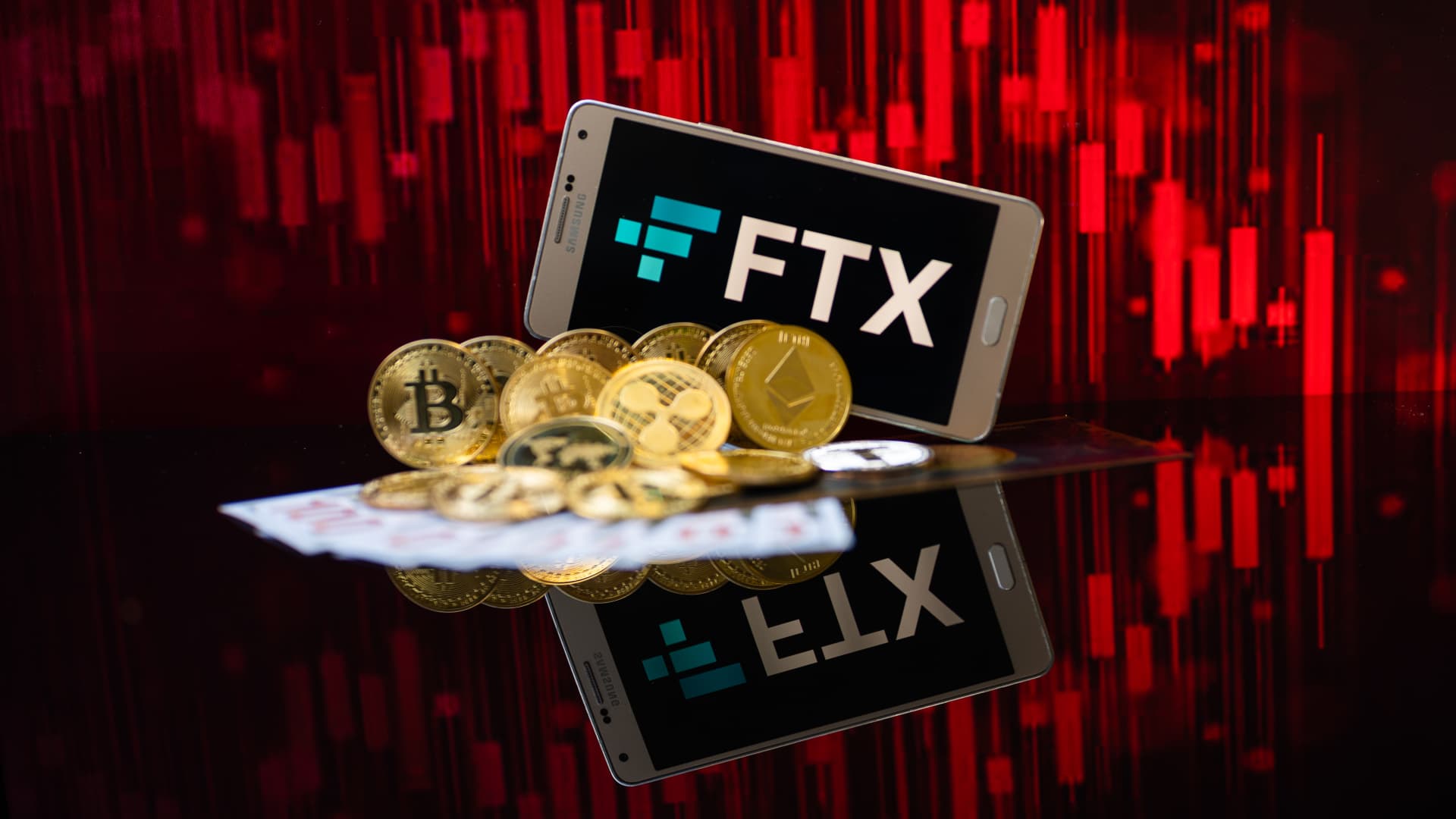
FTX logo with crypto coins with 100 Dollar bill are displayed for illustration. FTX has filed for bankruptcy in the US, seeking court protection as it looks for a way to return money to users.
Jonathan Raa | Nurphoto | Getty Images
Beleaguered cryptocurrency exchange FTX may have more than 1 million creditors, according to a new bankruptcy filing, hinting at the huge impact of its collapse on crypto traders.
Last week, when it filed for Chapter 11 bankruptcy protection, FTX indicated that it had more than 100,000 creditors with claims in the case.
But in an updated filing Tuesday, lawyers for the company said: “In fact, there could be more than one million creditors in these Chapter 11 Cases.”
Typically in such cases, debtors are required to provide a list of the names and addresses of the top 20 unsecured creditors, the lawyers said. However, given the scale of its debts, the group instead intends to file a list of the 50 largest creditors on or before Friday.
Five new independent directors have been appointed at each of FTX’s main parent companies, according to the filing, including the former Delaware district judge, Joseph J. Farnan, who will serve as lead independent director.
Over the past 72 hours, FTX has been in contact with “dozens” of regulators in the U.S. and overseas, the company’s lawyers wrote. These include the U.S. Attorney’s Office, the Securities and Exchange Commission and the Commodity Futures Trading Commission.
This year has seen a spate of crypto firms, including Celsius and Voyager Digital, fail as they contend with a slump in digital asset prices and ensuing liquidity issues.
In earlier bankruptcy cases, traders on these platforms have been designated “unsecured creditors,” meaning they’ll likely be at the back of a long queue of entities seeking repayment, from suppliers to employees.
Before its collapse, FTX offered amateur and professional traders spot crypto investing as well as more complex derivatives trades. At its peak, the platform was valued by investors at $32 billion and had more than 1 million users. The company’s failure has had a chilling effect on the industry, with investors selling their positions and moving funds off exchanges.
On Monday, the CEOs of Binance and Crypto.com sought to reassure investors about their businesses’ financial health. Binance’s Changpeng Zhao said his exchange had only seen a minor increase in withdrawals, while Crypto.com chief Kris Marszalek said his firm had a “tremendously strong balance sheet.”
Commingling of client funds
FTX entered bankruptcy Friday as concerns over its financial health led to a surge in withdrawals and a plunge in the value of its native FTT token. Sam Bankman-Fried, FTX’s founder, stepped aside as CEO and was replaced by John J. Ray III.
FTX initially turned to Binance for a rescue deal, but this fell apart when Binance backed out citing reports of mishandled customer funds and alleged U.S. government probes into FTX. Over the weekend, FTX was hit with an apparent cyberattack resulting in the theft of more than $400 million worth of tokens.
“FTX faced a severe liquidity crisis that necessitated the filing of these cases on an emergency basis last Friday,” lawyers wrote in the filing Tuesday. “Questions arose about Mr. Bankman-Fried’s leadership and the handling of FTX’s complex array of assets and businesses under his direction.”
CNBC reported Sunday that Alameda Research, FTX’s sister company, had borrowed billions in customer funds from the exchange to ensure it had enough liquidity on hand to process withdrawals.
In general, mixing customer funds with counterparties and trading them without explicit consent is illegal, according to U.S. securities law. It also violates FTX’s terms of service.
Bankman-Fried declined to comment on allegations but said the company’s recent bankruptcy filing was the result of issues with a leveraged trading position.
“I think it’s increasingly clear, even at a basic level, that this kind of intermingling of interests between the market maker and the exchange is highly unethical,” Jamie Burke CEO and founder of Web3-focused venture capital firm Outlier Ventures, told CNBC.
In a cryptic Twitter thread this week, Bankman-Fried wrote the word “What” followed by the letters “H,” “A,” “P,” “P,” “E,” “N,” “E,” “D,” in intermittent tweets.
He finished the thread Tuesday with the sentence: “10) [NOT LEGAL ADVICE. NOT FINANCIAL ADVICE. THIS IS ALL AS I REMEMBER IT, BUT MY MEMORY MIGHT BE FAULTY IN PARTS.]”






